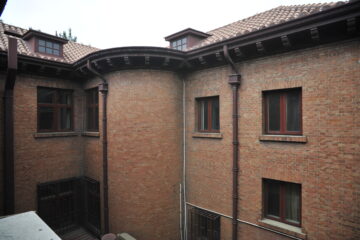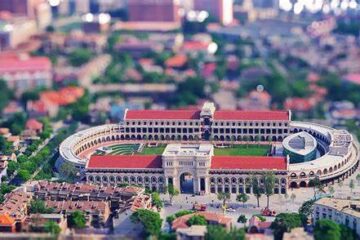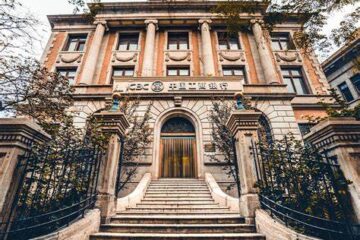Astor hotel
建筑简介:整体三层,转角为五层,维多利亚女王时期盛行的装修风格,强烈的英国风格。方形塔楼灵感来源于中世纪英国城堡。
Architectural Introduction: The building has three floors in total and five floors at the corner. It is decorated in a style that was popular during the Victorian era and has a strong British style. The square tower is inspired by medieval English castles.
小楼故事:1860年英法联军在中国发动了第二次鸦片战争,打开了天津这个通向北京的门户,清政府被迫把天津开辟为对外通商口岸,此后天津又相继出现了九国租界。1863年春天,在天津传教近两年的英国牧师约翰·殷森德(1829-1904),在天津英租界内靠近海河的位置,买了6亩地,建造了瓦楞铁顶的英式平房,作为货栈、旅馆和饭店之用,人人们俗称“泥屋”,这就是利顺德大饭店最初的模样,“利顺德”三个字出自孟子的“利顺以德”。1886年殷森德集资将饭店改建成为三层,转角为五层的塔楼,原有的建筑面积扩到6200平方米,成为当时天津市最高的建筑物。1870年后的二十多年间,李鸿章(1823-1901)作为直隶总督兼北洋大臣稳坐天津,因此天津成为了当时中国最重要的经济、外交和文化的中心政治。从1863年至19世纪末,利顺德大饭店是天津所有外交活动的场所,当时英国领事馆的大多数会议都在这里举行,而美国则是第一个把领事馆设在利顺德的国家。利顺德地处英租界,这个租界地享受着治外法权,在相当一个时期那些下野的失意的政客军阀包括前清的遗老遗少落魄之后就到了天津当起了寓公,所以他们成为了利顺德的常客,正是在各种因素之下,利顺德它就成为了中外宾客云集之地。许多政要名流都曾寓居于此或在此下榻孙中山、李鸿章、梁启超、周恩来等等这些在中国历史上举足轻重的人物都在这里留下为人津津乐道的故事。当年利顺德大饭店里的西餐成为清朝末代皇帝溥仪在天津生活的牵绊,溥仪和婉容酷爱吃冰激凌,久而久之饭店的厨师根据溥仪的口味专门配置冰激凌,后来叫做溥仪冰激凌。依照溥仪口味西餐主厨还专门为他烹制了独具特色的羊排,时至今日这道精选羊排配红酒汁已经成为利顺德大饭店名人菜单中的一道主菜。
The Story of Xiaolou: In 1860, the British and French coalition launched the Second Opium War in China, opening Tianjin as the gateway to Beijing. The Qing government was forced to open Tianjin as a foreign trading port, and since then, nine concessions have emerged in Tianjin. In the spring of 1863, British pastor John Insend (1829-1904), who had been preaching in Tianjin for nearly two years, bought 6 acres of land near the Haihe River in the Tianjin British Concession and built a corrugated iron roofed English style bungalow for use as a warehouse, hotel, and restaurant. People commonly referred to it as the “mud house”, which was the original appearance of the Lishunde Hotel. The three words “Lishunde” came from Mencius’ “Lishunde follows virtue”. In 1886, Yin Sende raised funds to renovate the restaurant into a three story tower with a five story corner. The original building area was expanded to 6200 square meters, making it the tallest building in Tianjin at that time. For more than 20 years after 1870, Li Hongzhang (1823-1901), as the Governor General of Zhili and Minister of Beiyang, held a stable position in Tianjin, making it the most important economic, diplomatic, and cultural center of politics in China at that time. From 1863 to the end of the 19th century, the Lishunde Hotel was the venue for all diplomatic activities in Tianjin. At that time, most meetings of the British Consulate were held here, and the United States was the first country to set up a consulate in Lishunde. Lishunde is located in the British Concession, which enjoys extraterritoriality. For a considerable period of time, those disillusioned politicians and warlords, including the elderly and young people of the former Qing Dynasty, who had fallen into poverty, came to Tianjin to work as prostitutes. Therefore, they became frequent visitors to Lishunde. It is precisely because of various factors that Lishunde has become a gathering place for Chinese and foreign guests. Many political figures and celebrities have resided here or stayed here. Key figures in Chinese history, such as Sun Yat sen, Li Hongzhang, Liang Qichao, Zhou Enlai, etc., have left behind fascinating stories here. At that time, the Western cuisine in the Lishunde Grand Hotel became a hindrance to the life of the last emperor of the Qing Dynasty, Puyi, in Tianjin. Puyi and Wanrong loved to eat ice cream, and over time, the restaurant’s chefs specially prepared ice cream according to Puyi’s taste, which later became known as Puyi Ice Cream. According to Puyi’s taste, the Western chef also specially prepared a unique lamb chop for him. Today, this carefully selected lamb chop paired with red wine sauce has become a main dish on the celebrity menu of Lishunde Hotel.



0 条评论